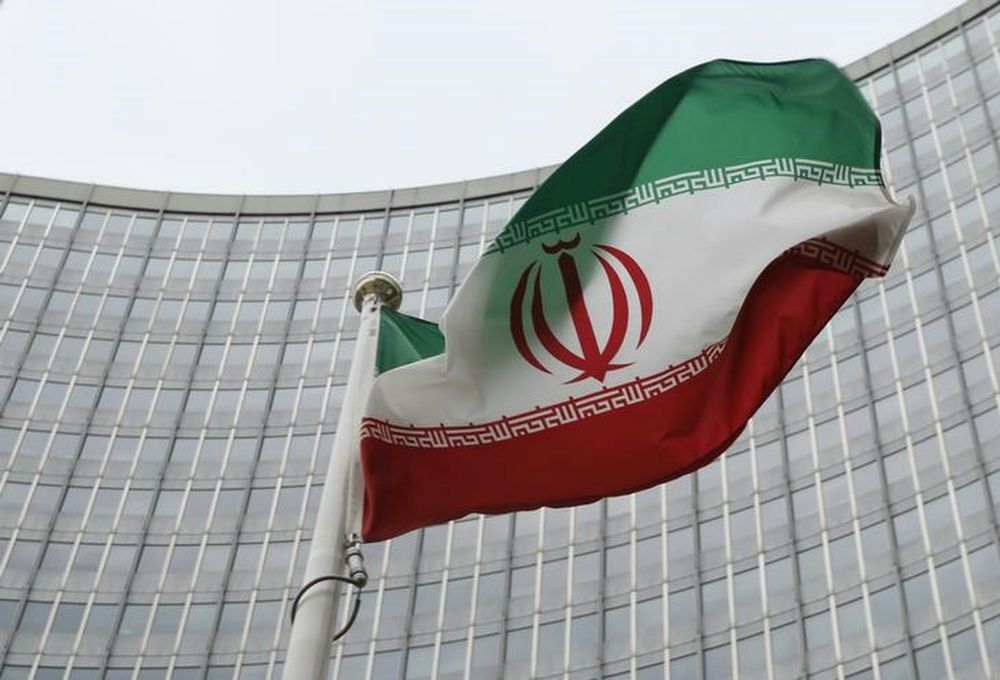
An Iranian flag waves in front of the International Atomic Energy Agency headquarters in Vienna, Austria, Jan.15, 2016. (CNS photo/Reuters/Leonhard Foeger, Reuters)
As President Donald Trump contemplates what to do with the 2015 multiparty agreement that halted Iran's nuclear weapons development, let's hope he listens carefully to his secretary of defense, Jim Mattis, who told a Senate committee Oct. 2 that sticking with the accord is in the United States' best interests.
Confirmation that Iran is abiding by the agreement has come not just from Mattis, but the U.S. State Department and the International Atomic Energy Agency, which is the actual monitoring agency. Britain, China, France, Germany and Russia — the other signatories to the accord — are satisfied that Iran is in compliance and they are pressing the White House to stay in.
Under a U.S. law, the Iran Nuclear Agreement Review Act, which is not part of the international agreement, the president must certify to Congress every 90 days that Iran is abiding by the deal, or Congress can reimpose economic sanctions against Iran. Twice already Trump has made that certification, but as the next deadline, Oct. 15, approaches, he is showing great reluctance.
Regrettably, the president's reluctance has nothing to do with reality and everything to do with campaign promises. As a candidate he promised to scrap the deal with Iran, which he described (ignoring all evidence to the contrary) as "the worst deal ever." Having been thwarted in keeping other campaign promises — no border wall is being built, and the Affordable Care Act is still the law of the land — Trump must be feeling very frustrated. Unlike those other promises that require him to negotiate and come to agreement with members of Congress, decertifying the Iran deal is something he can do unilaterally.
In the end, though, decertifying the agreement and sending it back to Congress is a cynical political ploy that allows him to claim victory but shifts the real work of governing to Congress. Trump has used the same tactic on health care and the Deferred Action for Childhood Arrivals immigration program.
Advertisement
The difference this time is that he is diminishing U.S. standing in the world. We have come to accept that wisdom and prudence are not characteristics to be found in this administration. But perhaps not only his own Cabinet members but wide reaction from around the world might convince Trump of the self-interest in upholding the agreement.
The White House says that Iran is in "technical compliance" with the agreement, but it is violating the "spirit" of the accord. This is a distinction without a difference. As long as Iran is in technical compliance, they are not developing nuclear weapons. That is the point of this agreement, and it is being met.
The United States has legitimate complaints against Iran. It is conducting nonnuclear ballistic missile tests, and its support of Hezbollah and Syria and other adventurism in the Middle East contributes to the destabilization of the region. The U.S. can and should address these issues outside the nuclear arms agreement and with its allies. That is how diplomacy works.
Five other nations and Iran are committed to make this agreement work, so it is likely that all a U.S. withdrawal would achieve is diminishment of the U.S. leadership in the world. That would be a great tragedy and should be avoided at all costs.
Trump's greatest nuclear challenge is not Iran, but North Korea, which is a ticking time bomb. Trump will need to build a solid, confident global partnership with real diplomatic muscle to defuse North Korea. Stepping away from the Iran deal won't make the world safer. It will be a more dangerous place.




